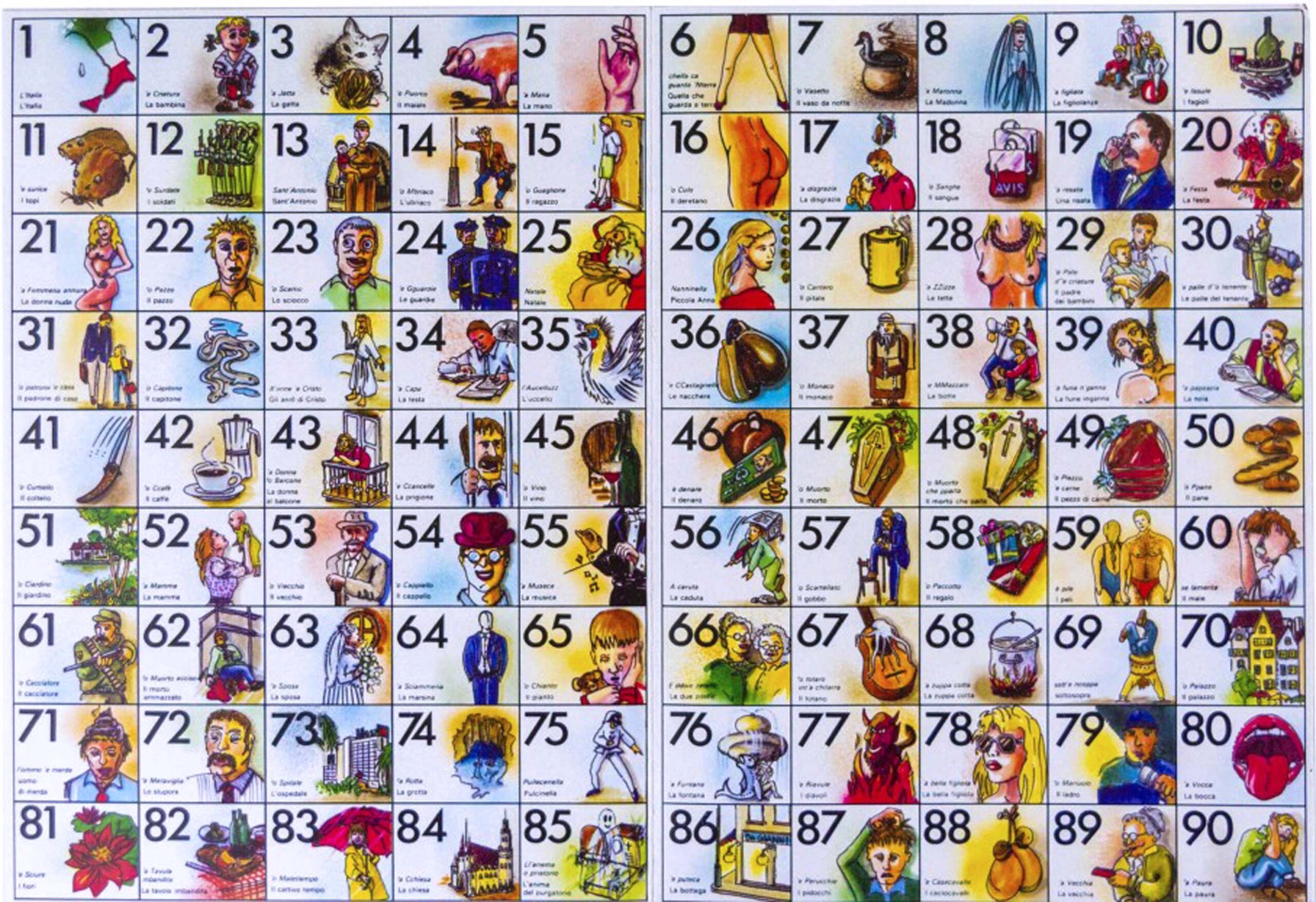Tombola is a very popular family game enjoyed in Italy throughout the Christmas season. It is most often played from Christmas Eve to the Epiphany and is an especially popular choice for families to play on New Year’s Eve. It is a simple game that transcends time and unites generations and is a great way to pass the time while awaiting the stroke of midnight on December 31.
What is perhaps so engaging about Tombola is its simplicity. In this age of technology, it is the kind of game that could easily become outdated in the minds of many, yet it has not. Year after year, Italian families and friends gather round and play for hours accompanied by snacks, drinks and conversation. It is the perfect game for New Year’s Eve because it allows loved ones to reminisce about the past year and share their hopes for the future.
Tombola is similar to the American game of bingo, yet it is far more entertaining. Instead of a just number on a board, the numbers on the tabellone are accompanied by symbols and nicknames. Some names are traditional, such as the number one representing Italy and the number 13 which represents Saint Anthony, since the saint’s feast day is June 13.
The game is simple and entertaining, yet its main purpose is to bring loved ones together. Grandparents tell their grandchildren stories about the past and small children shout when they win a prize. Families play for coins, beans or orange peels – which were the original currency of Tombola.
Throughout the country, the most commonly played form of the game is the Neapolitan version, which requires the game board with squares containing the numbers, each to be covered with a tombollino or marker, as the number is called. It also requires a series of numbered cards that players ‘purchase,’ each one containing blank squares and 15 squares containing random numbers arranged in three rows, each with five numbers. Finally, 90 round wooden or plastic tombolini, numbered from 1 to 90 are kept in a container that may vary from a cloth sack to a panariello, which is a small basket with a hole at the top from which they are extracted.
Tombola is traditionally played for money. Each card costs a set amount, perhaps five or ten cents. Players can purchase as many cards as they wish, except for the tombolone, who picks the numbers from a bag or basket. He or she must purchase six cards.
If a player has the number called, they place a dried bean or other marker on a number. The money from the cards is divided before the game starts into the five prizes, from lowest to highest, with tombola being the jackpot. The lowest prize, called the ambo, means that the player is the first to have two numbers on the same row. Terno has three numbers on the same row; quaterna, four numbers on the same row; cinquina five numbers and lastly, the grand prize or tombola for all 15 numbers on the card.
When extracting the numbers, the tombolone will often use colorful expressions for each one, based on a list known as the Neapolitan smorfia. Some of the most popular are number 9 – la rabbia (anger); 17 – la disgrazia (bad luck); 23 – la suocera (mother-in-law); 33 – gli anni di Cristo (Christ’s age); 45 – il vino buono (good wine); 48 – Il morto che parla (the talking dead man); 77 – le gambe (legs) and 90 – la paura (fear).
Legend has it that Neapolitan tombola originated in 1734 out of a dispute between the monarch Charles III (1716–88), King of Naples and Sicily and a Dominican monk named Gregorio Maria Rocco (1700–82). Because of his rousing sermons and work with the poor, Father Rocco was (according to author Alexander Dumas) “more powerful in Naples than the mayor, the archbishop and even the king.”
Up until then, the popular game of lotto had been clandestine, but the King wished to tax it. This would add a rich source of income to the royal coffers. But Father Rocco disagreed. He believed lotto was a “deceptive and amoral amusement” and in a country that strove to live by Roman Catholic teachings, it distracted the faithful from prayer. In the end, the King won, but only after agreeing that the game would be suspended during the Christmas period. The King’s subjects however, had no intention of complying with this edict, so as an alternative they replaced lotto with the almost identical tombola, which they enjoyed within the family, free from taxes and playable at any time, especially at Christmas. So why not start 2020 on the right note surrounded by loved ones, enjoying a part of Italian culture.





